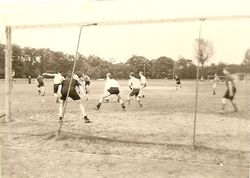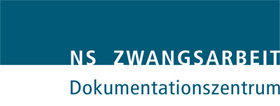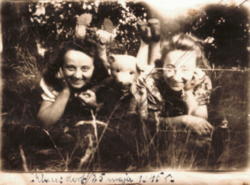
All of Europe kicked in Berlin
Football and forced labour under the Nazis
31 May - 3 November 2024
What is astonishing today: Forced labourers deported to Germany played football - albeit under strict regulations. Men from Poland and the Soviet Union were banned from playing the game for racist reasons, but some played anyway. After all, football was a welcome distraction to forget the hardships of everyday life in a foreign country and to assert themselves. Women were only allowed to attend the tournaments as spectators.
On the occasion of the UEFA EURO 2024 for men, the exhibition is dedicated to the forced labourers who played football. It is based on the testimony of a Dutchman with photos of his compatriots playing in tournaments against other teams. The biographies of a Dutch, a Polish and a German-Jewish forced labourer are also presented.
Deadly forced labour in Karya
German Occupation and the Holocaust in Greece
5 September 2024 - 2025
How can a joint confrontation in Germany and Greece with the little-known history of Nazi forced labour in occupied Greece be promoted? Innovative and participatory forms of teaching history and bi-national encounter projects strengthen mutual understanding and thus European values.
Based on previously unpublished photos of the forced labour of Jewish men on the railway line in Karya, a multi-perspective touring exhibition is being developed. With the involvement of students from Germany and Greece, the Conflict Landscapes Working Group of the University of Osnabrück is geoarchaeologically investigating the site for mass graves and traces of forced labour and developing a high-quality and visually appealing 3-D model that makes the crime scene tangible. In a participatory approach, the results of eyewitness encounters and workshops with descendants of survivors are incorporated into the German-Greek project.
The exhibition is funded by the Foundation EVZ.
The liberation of Nazi forced labourers in Berlin in 1945 (working title)
End of April 2025 - Autumn 2025
Around 500,000 Nazi forced labourers were held involuntarily in the "camp city" of Berlin during the war. How did they experience the period of upheaval in 1945, when they were liberated from the Nazi forced labour system?
Spring 2025 will mark the 80th anniversary of liberation from the Nazi regime. To mark this occasion, the experiences of civilian forced labourers, prisoners of war and concentration camp inmates from all over Europe who were forced to work in Berlin will be highlighted. The planned special exhibition will shed light on the period from the final phase of the war to the liberation by the Red Army and the immediate post-war period.

